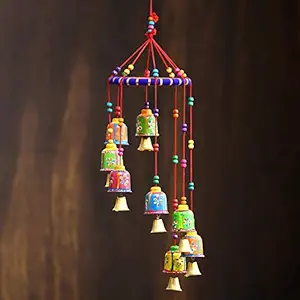પાવામાં પાવો વાગ્યો હો મા
કેસરિયા ગરબાનો રંગ લાગ્યો
હો રંગ લાગ્યો રંગ લાગ્યો રંગ લાગ્યો
કેસરિયા ગરબાનો રંગ લાગ્યો
આવી નોરતા ની નવ નવ રાતો માં
કેસરિયા ગરબાનો રંગ લાગ્યો
ગરબો રમતો રમતો આવે હો માં
કેસરિયા ગરબાનો રંગ લાગ્યો
રંગતાળી રંગતાળી રંગતાળી હો માં
કેસરિયા ગરબાનો રંગ લાગ્યો
Overview of "Pavama Pavo Vagyo Ho Ma"
Title & Meaning
'Pavama Pavo Vagyo Ho Ma' is a devotional Gujarati Garba song that praises Maa Amba with rhythmic claps and traditional melodies.
Artist & Recording Details
This Garba has been sung by many folk artists and is popularly played in community gatherings during Navratri nights.
Genre & Occasion
A devotional folk Garba song mainly performed in Navratri festivals with traditional dance formations.
Language & Dialect
Lyrics are in Gujarati with rich folk dialects, enhancing its authenticity in Garba performances.
Popularity & Versions
The song is highly popular across Gujarat and has both live and recorded versions performed by various groups.
Lyrics Structure & Themes
Devotional Invocation
The lyrics begin with heartfelt invocation of Maa Amba, asking for blessings and protection.
Repetitive Chorus
Repetitive claps and lines in chorus enhance rhythm, making it easier for dancers to follow.
Imagery & Symbolism
The song uses cultural symbols like dandiya, colors, and faith to represent devotion to Goddess Amba.
Community Participation
Lyrics emphasize togetherness, where all participants clap and sing in unison.
Emotional Resonance
It creates a devotional and joyful atmosphere, lifting spirits during Navratri Garba.
Musical & Performance Elements
Instrumentation & Rhythm
Traditional dhol, dholak, manjeera, and hand claps give the song its vibrant rhythm.
Tempo & Dynamics
Starts with a steady pace and gradually builds momentum, energizing the Garba circle.
Live vs Studio Renditions
Live renditions are longer with crowd energy, while studio versions are concise and polished.
Dance Cues & Movements
Lyrics guide rhythmic clapping and circular dance steps for all participants.
Audience Involvement
Encourages devotees to clap, sing, and dance together, making the Garba highly engaging.
Festival & Cultural Significance
Navratri Connection
One of the most cherished Garba songs, sung throughout Navratri to celebrate Maa Amba.
Spiritual Meaning
Symbolizes surrender to the Goddess, seeking divine blessings, peace, and prosperity.
Preservation of Folk Heritage
Represents Gujarati folk music and cultural practices passed through generations.
Community Bonding
Strengthens community ties as devotees gather, sing, and dance together.
Joyful Spirit
Spreads joy, devotion, and positive energy among people during festivals.
How to Use & Share
Translations & Transliteration
Provide translations for non-Gujarati audiences to understand the song’s devotional meaning.
Audio & Video Embeds
Embed YouTube or audio versions for better audience engagement.
Printable Lyrics & Downloads
Offer lyrics in PDF or printable format for Garba groups and learners.
Performance Tips
Provide simple Garba steps, hand movements, and rhythm patterns for beginners.
SEO & Social Sharing
Use keywords like 'Gujarati Garba', 'Navratri song', 'Maa Amba Garba' to rank better; add social sharing options.
'Pavama Pavo Vagyo Ho Ma' is a devotional Gujarati Garba song that praises Maa Amba with rhythmic claps and traditional melodies.
This Garba has been sung by many folk artists and is popularly played in community gatherings during Navratri nights.
A devotional folk Garba song mainly performed in Navratri festivals with traditional dance formations.
Lyrics are in Gujarati with rich folk dialects, enhancing its authenticity in Garba performances.
The song is highly popular across Gujarat and has both live and recorded versions performed by various groups.
The lyrics begin with heartfelt invocation of Maa Amba, asking for blessings and protection.
Repetitive claps and lines in chorus enhance rhythm, making it easier for dancers to follow.
The song uses cultural symbols like dandiya, colors, and faith to represent devotion to Goddess Amba.
Lyrics emphasize togetherness, where all participants clap and sing in unison.
It creates a devotional and joyful atmosphere, lifting spirits during Navratri Garba.
Traditional dhol, dholak, manjeera, and hand claps give the song its vibrant rhythm.
Starts with a steady pace and gradually builds momentum, energizing the Garba circle.
Live renditions are longer with crowd energy, while studio versions are concise and polished.
Lyrics guide rhythmic clapping and circular dance steps for all participants.
Encourages devotees to clap, sing, and dance together, making the Garba highly engaging.
One of the most cherished Garba songs, sung throughout Navratri to celebrate Maa Amba.
Symbolizes surrender to the Goddess, seeking divine blessings, peace, and prosperity.
Represents Gujarati folk music and cultural practices passed through generations.
Strengthens community ties as devotees gather, sing, and dance together.
Spreads joy, devotion, and positive energy among people during festivals.
Provide translations for non-Gujarati audiences to understand the song’s devotional meaning.
Embed YouTube or audio versions for better audience engagement.
Offer lyrics in PDF or printable format for Garba groups and learners.
Provide simple Garba steps, hand movements, and rhythm patterns for beginners.
Use keywords like 'Gujarati Garba', 'Navratri song', 'Maa Amba Garba' to rank better; add social sharing options.


